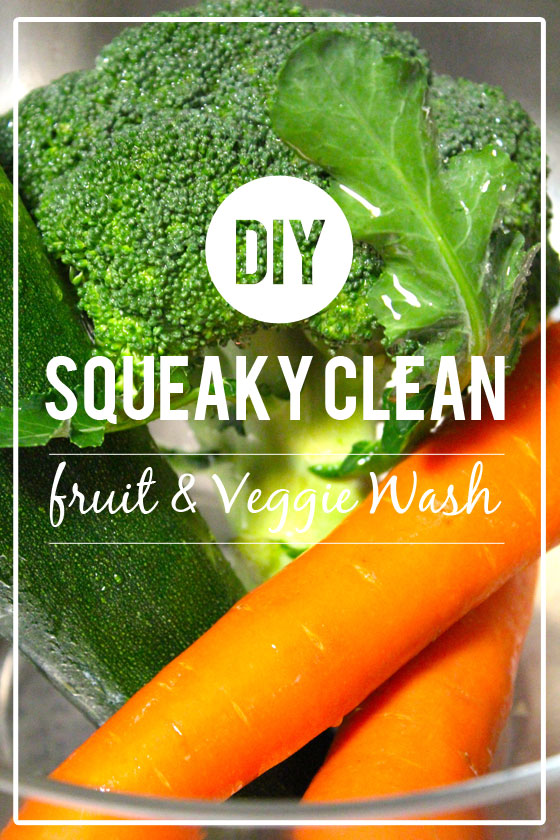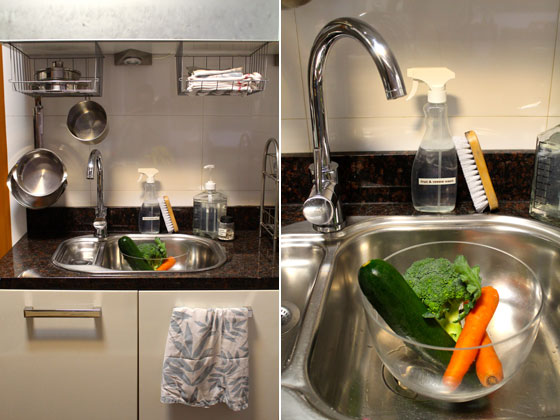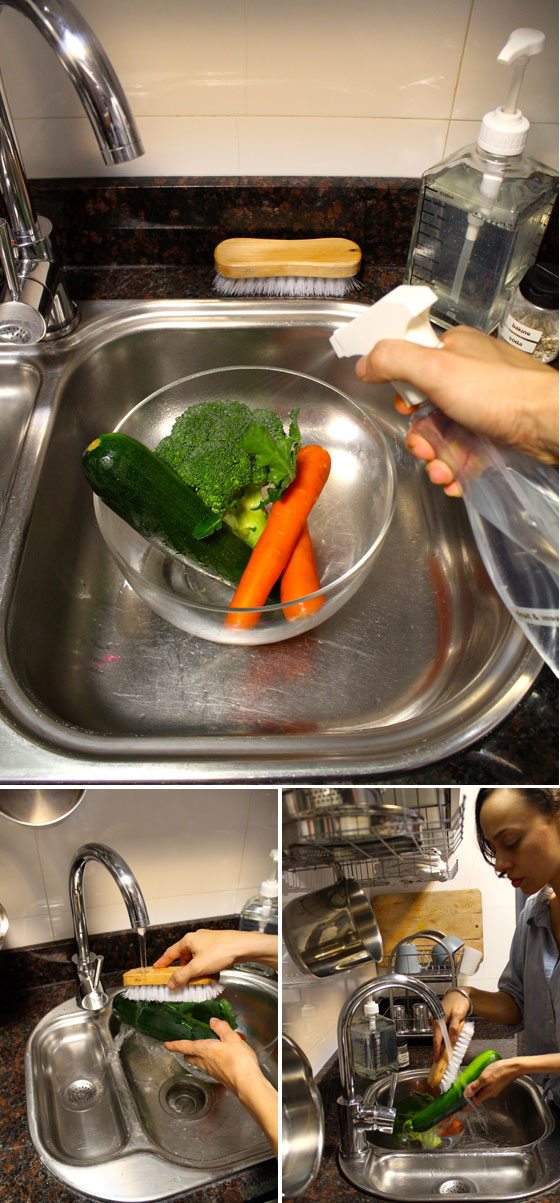Do you always give your fruit and veg a good wash before biting in? I’ll be honest, not always. Sometimes, when I’m really feeling a bit… lazy, I’ll do a quick splash under the tap, but if there were any pesticides or bacteria there that could do damage I wouldn’t have made a dent in it. No more excuses! I now have the best, easiest, no-fuss recipe for a Fruit & Veggie Wash – that puts the clean in clean eating!

Recently, I became a volunteer community farmer, and getting close to your food makes you think about where it all comes from. The fact is that before your potatoes or apples reach you, your produce has been handled by several pairs of hands from the field, through the warehouse and to the grocery store. In commercial farming, they are sprayed with chemicals and pesticides – and bacteria can be introduced at any point, from the fertilizer used, to poor hygiene practices by the handlers or even on your own kitchen counter.
Basically, that wholesome apple that you are about to bite into can pack a lot more than just vitamins! Doctors are most concerned with bacteria and pathogens, like e. coli and salmonella, as well as other common strains of bacteria that can multiply rapidly in our gut. Though pesticides are deemed safe for human consumption, the cumulative effect of consuming different types of pesticides, over a long period is a concern. Some types of pesticides have been linked to cancer and may affect the hormone or endocrine system. In frogs, it changes males to females. In children, it can cause early puberty or fertility issues. They’re not making it easy for us, are they!

I’ve been looking into the matter and found some really interesting studies where researches tested the effectiveness of washing, using four different methods, for removing bacteria and chemicals. They tested plain water, scrubbing with water, soap and vinegar. The study showed that while soap did work, most agree that adding detergents to your food is not a good idea. Water with scrubbing was effective at removing some pesticide residue and bacteria but, the most effective was a vinegar rinse with scrubbing, removing up to 75% of pesticides and 98% of bacteria! Is there anything vinegar can’t do?
Soaking and splashing under the tap alone will not work. You need friction. Pesticides are designed to stick – so you’ll need to roll-up your sleeves and give it a good scrub. Buy yourself a produce scrub and keep it next to your sink. In my kitchen, next to my sink, I now keep my veggie wash, dish soap & baking soda handy which handles pretty much all of my kitchen cleaning needs (I’m going to let you in on a secret: the veggie wash also makes a great counter cleaner – so, you don’t need to double up! Keep it simple!)

Fruit & Veggie Wash
Ingredients:
- vinegar
- water
Directions:
- Fill a spray bottle with one part vinegar and two parts water
How To Use:
For all produce, even when you don’t eat the skin, use this method:
- Spray the produce with Fruit & Veggie Wash. Let it sit for at least 10 minutes, then scrub the skin and rinse with water.
For soft, delicate produce, use this method:
- Fill a bowl with your produce and cover with Fruit & Veggie Wash. Let it soak for at least 10 minutes then rinse in a colander shaking and agitating it much as you can.

16 responses to “Make Your own Fruit & Veggie Wash”
Hi militza,
where did you get your produce scrub?
Hi Tiffany! Try any kitchen wear shop. I know Pantry Magic sells them. Or, if you can’t find it – you could even use a nail brush, or hard bristled toothbrush!
http://www.pantry-magic.com/
Hi militza,
How do you deal with green leafy vegetable?
Hi Shooka! What I would do is spray the leaves with the Fruit & Veggie Wash, let it sit for about 10 minutes then rinse it in a colander shaking it and rubbing it with your hands as much as you can without breaking the leaves. Chemical & pesticide residue will always be harder to remove from leaves and delicate fruit because you can’t scrub hard, but, at least with the wash, you remove bacteria!
What about broccoli? Soak it for 10 then rinse thoroughly as well?
Hi Ashley & Susan! Actually, I had broccoli for dinner yesterday – what I did was to spray it very well with the Fruit & Veggie Wash. Broccoli is very compact, so I made sure that the spray really got in there! Then let it sit for 10 minutes. I then ran it under water and rubbed it clean with my fingers.
Broccoli is actually quite low on the scale of pestide residue, but with the other things like apple, celery, capsicum, berries.. they have the highest amounts of residue and for some, even soak it in, which we can’t remove at all. If you are concerned with pesticides, I would recommend shopping according to the dirty dozen, clean 15 list, scrubbing and peeling what is non-organic.
But, for bacteria and pathogens on your food, a good spray of the Fruit & Veggie wash and some friction with a scrub or your hands, will do the job!
I’m keen to know about broccoli too 🙂
May I ask what kind of vinegar do you use? Do you think it’ effective to use rice water or salt with water to remove pesticide?
Hi Magdalene! I use a plain white distilled vinegar – If you live in Singapore – I save money by buying my vinegar in 1L sizes at Phoon Huat for around $6!
For pesticides, vinegar helps to breakdown and wash away a lot of the residue, but at the end of the day – the only way to remove them is by scrubbing – really it’s the friction that removes pesticides. That said, you can’t scrub away 100% of it and if the veg has soaked it in, then it’s impossible to remove.
I personally cannot afford to eat only organic produce – I do the best that I can, often I’ll choose organic apples and berries, since my family eat a lot of them and they are high on the pesticide list. For the rest of it, I just scrub hard and/or peel.
Since scrubbing is what really helps to remove most pesticide residue, you could do it with just water alone, or a solution of water and vinegar. Hope that helps!
Hey Militza, I got a 2-litre white vinegar (Brand: Tai Hua) from Giant at $4 only!
Hi Jean! Whoah, I’ll have to check that out! Thanks a million for sharing 🙂
Hi Militza,
do you do the same with organic vegetables?
Hi Cathy – yeah, it’s a good idea to wash them, even if organic, just because of handling and dirt. Vinegar is really good for cleaning away bacteria that may be present.
Hi Militza,
may I know where you get the spray bottle used for storing the veggie wash? I try to avoid plastic as much as possible but it’s impossible to find a spray bottle that uses glass in Singapore. Please tell me it’s alright to use plastic to store the veggie wash.
Hi Rebecca! I haven’t seen glass spray bottles for cleaning – but you can look to cosmetic bottles – this shop is a good resource for glass bottles and vials: http://www.massagesupplies.com.sg/bottlesandjars1.htm
I think their shop is better than their online shop – so if you are ever in the area, check it out! 🙂
Hi Militza,
Should I do the same for leafy greens? How should I do for strawberries?